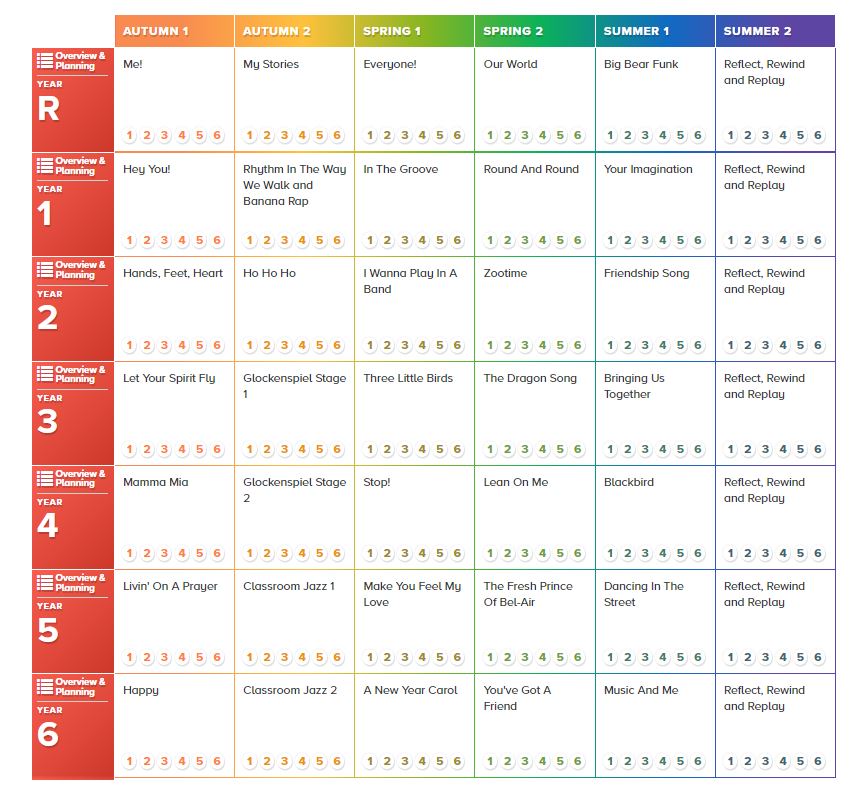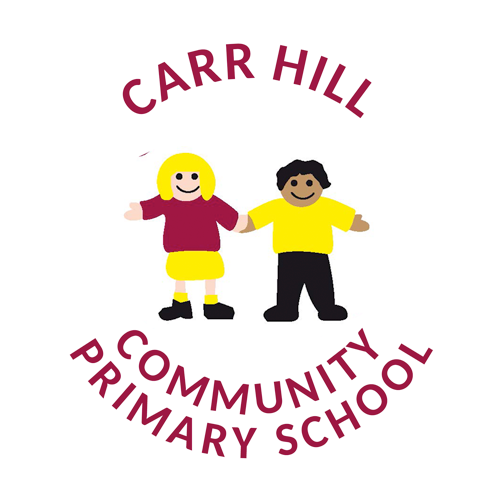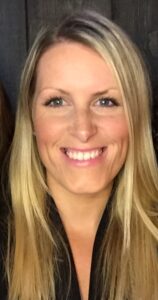Miss Henderson leads the teaching of Music in School.
Our Intent for Music
At Carr Hill our aim is to provide high quality music education that engages and inspires pupils to develop a love of music and nurtures their talent as musicians.
We recognise that through Music pupils can increase their self-confidence, sense of belonging, creativity and musical achievement. Our teaching focuses on developing the children’s ability to understand rhythm and follow a beat. Through singing songs, children learn about the structure and organisation of music. We teach them to listen and to appreciate different forms of music. Children develop descriptive language skills in music lessons when learning about how music can represent different feelings, emotions and narratives. We also teach technical vocabulary such as volume, pitch, beat and rhythm and encourage children to discuss music using these terms.
Our Implementation for Music
At Carr Hill we follow Charanga. Charanga is a scheme of work which offers a topic-based approach to support children’s learning in music. A steady progression plan has been built into Charanga, both within each year and from one year to the next, ensuring consistent musical development. By using Charanga as the basis of a scheme of work, we can ensure that they are fulfilling the aims for musical learning stated in the National Curriculum:
Charanga includes many examples of music styles and genres from different times and places. These are explored through the language of music via active listening, performing and composing activities, which enable understanding of the context and genre.
Charanga provides a classroom-based, participatory and inclusive approach to music learning. Throughout the scheme, children are actively involved in using and developing their singing voices, using body percussion and whole-body actions, and learning to handle and play classroom instruments effectively to create and express their own and others’ music. Through a range of whole class, group and individual activities, children have opportunities to explore sounds, listen actively, compose and perform.
In addition to Charanga. UKS2 have access to Gateshead Music Service where specialist teachers come into school and teach a variety of different instruments such as Ukulele, African Drums and Violin.
Gateshead music Service also provide an annual music workshop to allow children to explore different instruments and listen to live music.
We have termly training sessions provided by Gateshead Music service to teachers and teaching assistants to support professional development when teaching and delivering music.
We have a weekly Glee club where children have the opportunity to sing and perform.
The Impact of Music
We are commitment to providing high quality music education for all children in our school.
By teaching the children a high-quality music curriculum, rich in opportunity to explore different musical genres and exposing children to a range of different musical instruments, we will foster a love of music. Children will achieve age related expectations in music at the end of their cohort year. Children will retain knowledge that is pertinent to music. They will have the opportunity to foster their instrumental flare and use this as a form of expression. We will assess this through lesson observations, pupil interviews and music performances.
Purpose of study
Music is a universal language that embodies one of the highest forms of creativity. A high-quality music education should engage and inspire pupils to develop a love of music and their talent as musicians, and so increase their self-confidence, creativity and sense of achievement. As pupils progress, they should develop a critical engagement with music, allowing them to compose, and to listen with discrimination to the best in the musical canon.
Below are links to Carr Hill’s knowledge progression steps for each year group:
Aims
The national curriculum for music aims to ensure that all pupils:
- perform, listen to, review and evaluate music across a range of historical periods, genres, styles and traditions, including the works of the great composers and musicians
- learn to sing and to use their voices, to create and compose music on their own and with others, have the opportunity to learn a musical instrument, use technology appropriately and have the opportunity to progress to the next level of musical excellence
- understand and explore how music is created, produced and communicated, including through the interrelated dimensions: pitch, duration, dynamics, tempo, timbre, texture, structure and appropriate musical notations
Subject content
Key stage 1
Pupils should be taught to:
- use their voices expressively and creatively by singing songs and speaking chants and rhymes
- play tuned and untuned instruments musically
- listen with concentration and understanding to a range of high-quality live and recorded music
- experiment with, create, select and combine sounds using the interrelated dimensions of music
Key stage 2
Pupils should be taught to sing and play musically with increasing confidence and control. They should develop an understanding of musical composition, organising and manipulating ideas within musical structures and reproducing sounds from aural memory.
Pupils should be taught to:
- play and perform in solo and ensemble contexts, using their voices and playing musical instruments with increasing accuracy, fluency, control and expression
- improvise and compose music for a range of purposes using the interrelated dimensions of music
- listen with attention to detail and recall sounds with increasing aural memory
- use and understand staff and other musical notations
Progression Documents
Planning
Charanga Music Scheme
Here is an overview of the topics we teach in each year group.

Knowledge Organisers
Year 1: Knowledge Organiser Year 1
Year 2: Knowledge Organiser Year 2
Year 3:Knowledge Organiser Year 3
Year 4: Knowledge Organiser Year 4
Year 5: Knowledge Organiser Year 5
Year 6: Knowledge Organiser Year 6
Music Development Plan 2024 – Carr Hill Community Primary School
This is a summary of how our school delivers music education to all our pupils across three areas – curriculum music, co-curricular provision and musical experiences – and what changes we are planning in future years. This information is to help pupils and parents or carers understand what our school offers and who we work with to support our pupils’ music education.

